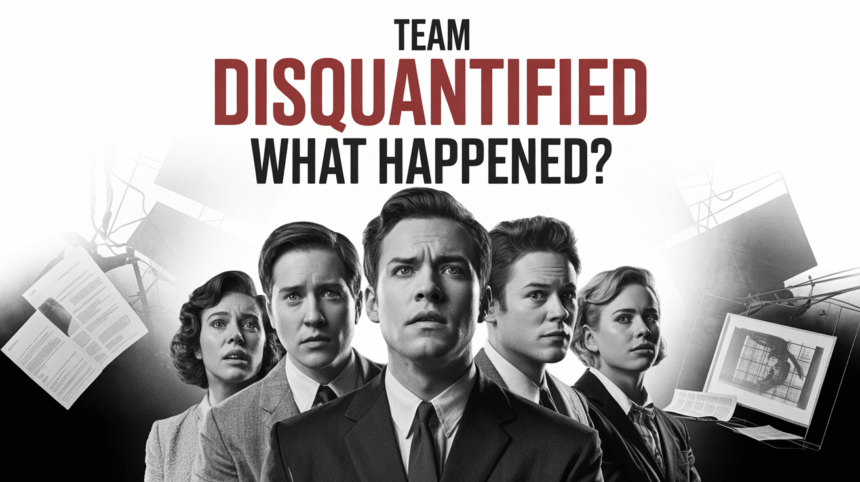The phrase team disquantified often sparks confusion due to its uncommon structure. While the correct term is typically team disqualified, “disquantified” may arise from miscommunication, mistranslation, or slang used in competitive circles. Regardless, understanding the implications of a team being disqualified is critical in sports, esports, and professional competitions.
Below is a brief profile of the concept and how it’s often contextualized in various fields.
Profile Biographie Table: Team Disquantified
| Attribute | Details |
| Term | Team Disquantified (commonly used instead of “Team Disqualified”) |
| Proper Usage | Team Disqualified |
| Field | Sports, Esports, Competitions, Academic Tournaments |
| Common Causes | Rule violations, cheating, roster violations, technical infractions |
| Impact | Elimination from event, loss of rewards, reputational damage |
| Famous Instances | FaZe Clan (Esports), Russia (Olympics), Juventus (Calciopoli scandal) |
| Misinterpretation | Often confused or used interchangeably with “disqualified” |
| Relevance Today | Frequently seen in online discussions, especially among younger audiences |
What Does “Team Disquantified” Mean?
While not technically a dictionary word, team disquantified is widely understood to mean that a team has been disqualified. It refers to a situation where a team is removed from competition due to a breach of rules or regulations.
The misuse of the word “disquantified” can often be traced to non-native English speakers or automated translations. Still, the intended meaning is clear within competitive contexts.
Common Reasons for Team Disqualification
Many teams face disqualification each year, and the reasons vary depending on the type of competition. However, common causes include:
- Cheating or Match Fixing: Using hacks or collaborating with opponents to fix outcomes.
- Roster Violations: Fielding ineligible players or substituting without approval.
- Technical Infractions: Equipment manipulation or unauthorized devices.
- Misconduct: Violence, threats, or unsportsmanlike behavior.
- Substance Abuse: Particularly in Olympic-level or professional physical sports.
High-Profile Examples of Team Disqualification
FaZe Clan (Call of Duty League)
FaZe Clan once faced penalties for failing to adhere to league rules around player transfers. While not entirely disqualified, they were fined and docked points, sparking online discussions with terms like “disquantified” trending.
Russia in the Olympics
Due to state-sponsored doping programs, Russia was banned from several Olympic Games. Teams representing the country were disqualified or forced to compete under a neutral flag.
Juventus F.C. – Calciopoli Scandal
In 2006, Juventus was stripped of its Serie A titles and demoted due to a match-fixing scandal, effectively disqualifying them from competing at their earned level.
How Disqualification Affects Team Rankings and Reputation
When a team is disqualified, the impact goes beyond that specific competition. It can:
- Strip the team of titles and medals.
- Affect sponsorships and revenue.
- Damage the credibility of players and coaches.
- Lead to bans from future events.
Misuse of the Word “Disquantified” in Popular Culture
Interestingly, disquantified has become something of a meme in online communities. Despite being grammatically incorrect, it’s often used in gaming chats, Reddit forums, and TikTok comment sections to humorously refer to bans or disqualifications.
Some esports fans even intentionally use “disquantified” as slang to mock officiating decisions or trolling incidents.
Team Disquantified vs Team Disqualified: Language Clarification
| Term | Meaning | Correct Usage |
| Disqualified | Officially removed from a contest due to rule violation | ✅ Yes |
| Disquantified | Informal/mistaken version of “disqualified” | ❌ No (slang) |
The confusion might stem from the similarity to terms like unqualified or disqualified, and words like quantified.
Preventing Team Disqualification
To avoid being disqualified (or “disquantified”), teams must:
- Thoroughly review event rules.
- Maintain clear communication with event officials.
- Use approved gear and equipment.
- Promote integrity and ethical conduct.
Pro teams often assign managers to handle compliance specifically to prevent such costly issues.
Conclusion
Whether it’s a case of semantics or slang, the term team disquantified ultimately refers to teams being removed from competition. While the word itself is non-standard, it highlights a real and serious consequence in sports and competitive gaming — the disqualification of an entire team due to infractions. Understanding the reasons behind such rulings and learning from historical cases can help teams avoid similar fates.
Read more: What Has Kiolopobgofit In It? Full Breakdown of This Viral Trend
FAQs about Team Disquantified
It’s an informal or incorrect way of saying a team has been disqualified from a competition.
No, “disquantified” is not found in formal English dictionaries. The correct term is “disqualified.”
Typical reasons include cheating, using ineligible players, violating technical rules, or misconduct.
Yes. Examples include Russia in the Olympics for doping violations and Juventus F.C. in the 2006 match-fixing scandal.
In most professional events, yes — teams can submit an appeal. However, success rates vary.
Absolutely. Disqualification can lead to fines, lost titles, and damaged credibility.











